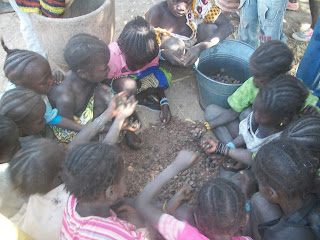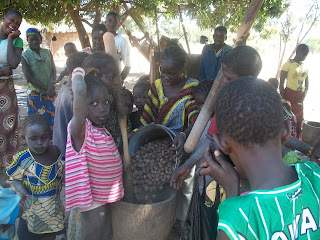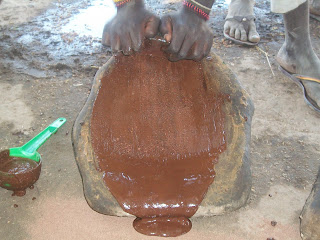"The keys to patience are acceptance and faith. Accept things as they are, and look realistically at the world around you. Have faith in yourself and in the direction you have chosen."
In Mali, people normally don't show up on time, if they show up at all. Your meetings get interrupted for greetings, or because they traveled by donkey cart and it took ages. People get sick and their lives get canceled for a while. You feel proud of yourself that you understood a full conversation to ask again and realize you understood nothing. People tell you you're going one place when you're going to another. Every day this happens, so it seasons you to accept this as your life and roll with it.
It's a great life lesson. Life doesn't always go as planned and flexibility is key when life throws you a curve ball.
Saturday illustrated this point. My service patron (boss), Sabou, asked me to come into Si Nafa, our women's shea butter cooperative. She wanted me to come in with my bike, so that I could bike with an old man to look at some shea. That's the information they gave me.
So, Saturday morning I showed up at Si Nafa to go to some shea-producing village with an old man on our bikes. When I left the house, I told my friend, Michelle, I'd probably only be gone for an hour or so, and that I'd be back sooner rather than later.
When we get on our bikes, they asked me where my water was. I told them if the place isn't far, then I can get some water there (dumb move - I know by now that I need water everywhere I go, it's so easy to get dehydrated here). They made me buy some water because they said the place was far, which was news to me.
Now, this old man I was going with was about 60 years old. He rode his bike really slowly...think of how fast a turtle crawls. I could have walked faster than our pace.
When they told me the place was far, I got a little agitated because I wanted to hang out with the new volunteers who came in on Saturday. I hadn't planned on spending my entire day riding my bike around in the brusse, especially without understanding why they had sent me there.
I wanted to tell the old man that I had stuff to do and that I needed to be somewhere soon...but instead, I decided to focus on the positive reasons I was doing this...to have faith that there was an important lesson on the other side of this village.
I thought about the fact that I would witness the shea butter producing process, and that I would get to meet some people in the brusse/bush (small village). I thought about how even if I didn't want to spend my Saturday in the middle of nowhere, I needed to respect this old man and abide by my patron's wishes. It was more a sign of respect and dedication to learning than anything else. As I rode my bike, I mentally listed all the benefits of going to this small village.
 |
| A tiny village on the way to Dambanan. |
When we arrived in the small village of maybe a few hundred people, the stampede of kids in awe by the white person began. The old man sat me down under a small hangar surrounded by a few mud-brick huts. He told me he was going to call the people of the village. I had no idea what this guy was doing, or really what I was doing there, but I decided to just roll with it.
When the old man left, groups of staring kids circled the place where I was chillin'. In small villages like this one, most of its inhabitants have never seen a white person - so you start to get used to the crowds of children, staring, gawking and screaming "Toubabu! Toubabu! Toubabu!."
I also couldn't help but feel like I needed to just sit there and not say much.
I was wearing American jeans and a T-shirt, with big sunglasses, an iPod, a nice bike, expensive shoes and a gold ring. These kids were wearing their soiled, shredded, too-big or too-small shirts on backward, inside out or hanging off of their shoulders. Most didn't have pants on. Or shoes, for that matter. Their faces and legs were layered with dust and chalk and mud. Many were probably nine years old or younger and many had rotting teeth. My eyes wandered to the shoeless mass of children whose feet were weathered like the older people's feet in my city of Kita. All these kids wanted to do was be my friend.
 |
| Just a small sample of the crowd of kids gawking at me, probably the first white person they've ever seen. They decided to become "one" with me by chalking their faces white. Interesting. |
When I would say something in Bambara, or eat a peanut, I could hear the crowd of about 20 kids' whispers ripple throughout the group.
Every now and then the old man would come back and shoo off the little, gawking kids and he'd leave again.
And then something strange happened, that other volunteers said they haven't witnessed before - a small group of the kids ran off into their huts to come back with completely white faces.
Double take - these kids dressed up in white face!
I talked to my tutor about it, and he humbled me by saying the kids noticed our skin wasn't the same, so they changed theirs so we would become one. And, they were curious. I guess if I saw my first purple person, I'd probably stare too, hahaha.
After about an hour of eating peanuts and laughing with the congregation of children, the old man returned to whisk me off to where the women start the shea butter production process.
In Kita, my women's shea cooperative buys already produced shea butter from more than 100 women in women's associations situated around Kita. My coop packages, markets and advertises the shea butter to sell.
 |
| Shea nuts before they're pounded |
 |
| A woman with an infant strapped to her back, sorting the grain |
 |
| The group of older women pounding grain |
In one corner, women were chatting with each other and pounding millet, corn or other grains. On the road behind us, men were directing donkeys on donkey carts barreling through with five feet high sticks and logs. The little boys segregated themselves by playing a marble game, with boys only. And the girls were doing the pounding of the shea nuts. I asked how old one of the girls who was pounding the shea nuts was. She was five years old.
Although child labor is illegal in America, after studying Mali for the past 11 months, I understand the need and cultural significance behind child labor here. I'm not saying it's right or wrong, but they need these children for a labor force, and for these children, it's an honor to be doing "man's" or "woman's" work. These are people who have little more than each other...
After they pounded the shea nuts to access the shea seeds, they separated the seeds out again to continue pounding them until shea oil was squeezed out. They'd put the pounded shea seeds into a big bowl, tip the bowl on its side and let the heavier, unpounded pieces of shea seeds glide to the bottom. The girls would pound the seeds again and again.
 |
| That's the old man, and the bowl of peanuts the woman gave me. They eventually sent me home with the bowl of peanuts. Malian hospitality. |
 |
| The little girls separating out the broken shea nuts and the shea seeds. The next step is to pound the shea seeds - which will squeeze out some of the shea butter. |
 |
| After pounding the shea seeds |
 |
| The old woman sifting the chunks of shea nut/seed out of the shea butter |
 |
I asked why the old woman did this work. My tutor explained that the pounding of the shea is extremely labor intensive work that an old woman cannot do anymore. The sifting and sorting and boiling of the shea takes intense concentration and work knowledge that only an old, experienced woman can do.
Next, two little girls, who were about eight years old, positioned these tablet-sized, smoothed, sloped-inward rocks so that they could push the shea butter out with a smooth rock. They placed sand under the rocks so the shea butter could fall onto the sand. The old woman detailed that the sand will easily wash out in the next step.
It had been several hours at this point and I was ready to go home, knowing that I had at least a one hour bike ride back to Kita on a dirt road.
The people of Dambanan welcomed me graciously, feeding me an enormous bowl of peanuts, offering me the best seat they had, smiling and joking with me just like I was Malian, one of them.
 |
| Women's work |
 |
| A girl, with a small baby tied to her back (probably her little sister or neighbor's kid), pounding the shea. Child labor starts early here! |
 |
| The best seat in the house - that they dragged all the way over to the shea production area so I could sit down as I observed |
Although it seemed as if this little bike trip with an old man threw a curveball into my day, I am really happy that I took the opportunity to witness the exhausting work these women put into making shea butter. I always say on my radio show that buying shea butter helps women, and helping women helps their entire village. But now, because of Dambanan's hospitality, I better understand the domino effect shea butter has on women, and thus, girls, families, entire communities, and especially, this country.
Shea butter is women's work here.
And when one person learns the benefits of shea, and they purchase just one bottle of it, that 1,000 CFAs (=$2), goes directly into empowering these women financially. And when one woman is helped, women usually give that time and money back into their families, and also their villages. So, helping women helps us all.
Saturday I learned a little more patience, a little more flexibility, and the women of Dambanan had no idea that they reinstated my faith in the path I have chosen.





















I would love to hear your radio show. Another great piece. This was really interesting and inspirational. I'm glad you got something out of it. Keep up the fantastic job u are doing there. Obviously they appreciate you.
ReplyDeleteLove mom
Dear Laura,
ReplyDeleteWhat a wonderful and special story again.
And because it is nou already 2012 I would like to wish you a inspiring and wonderfull 2012.
Sambè sambè.
Greetings,
Jaap